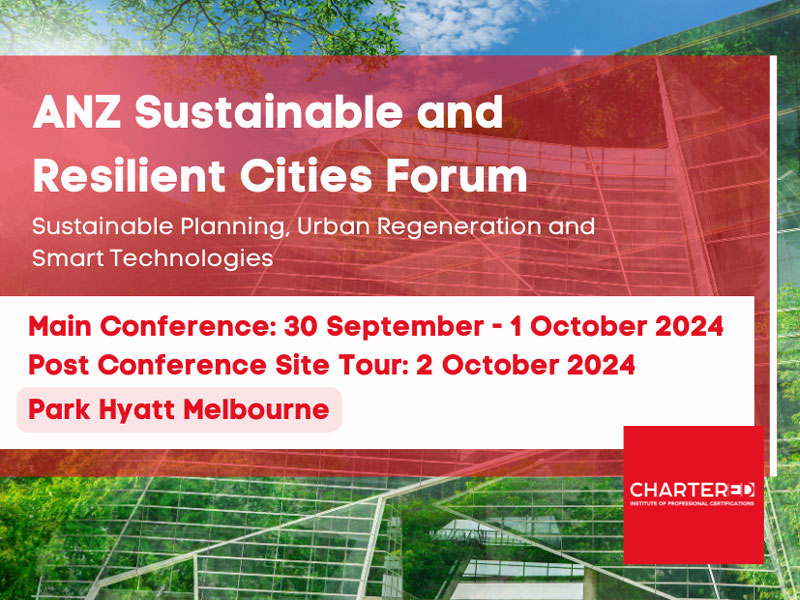Advances in technology are empowering planners to make better informed decisions about urban policy, helping create more sustainable Australian cities that are resilient to changes in population and climate.
Developing more sustainable urban policies is a priority for the Albanese government, which in the last federal Budget announced it would develop a comprehensive National Urban Policy — the first in over a decade.
Policymakers, urban planners, sustainability experts and leaders in technology will gather at the ANZ Sustainable and Resilient Cities Forum in Melbourne, to share their experiences using cutting-edge technologies to develop innovative sustainable policy ideas.

Sustainable urban planning technologies can provide valuable intelligence that helps policymakers make more informed decisions. Without proper planning, too much focus can be placed on the development of individual buildings, with not enough thought being put into the ‘in-between’ public areas and services required to sustain a community.
Organisations developing more sustainable planning practices have previously too often operated in silos, lacking an ability to share their knowledge and experience, which results in policies that opt for a local short-term fix rather than long-term sustainable strategies that benefit the whole of Australia.
The ANZ Sustainable and Resilient Cities Forum, which is organised by the Chartered Institute of Professional Certifications, will bring together experts, policymakers and technology leaders to share, learn and engage with other individuals passionate about the subject, encouraging the development of more innovative solutions to traditional urban planning problems.
Taking place at Park Hyatt Melbourne from 30 September to 2 October 2024, organisers say the ANZ Sustainable and Resilient Cities Forum will highlight local and international success stories, demonstrating how a diverse range of technologies are being used to prepare and plan.
Sustainable urban planning allows cities to evolve and adapt to a growing population, a changing environment, and extreme weather events. These challenges have created a demand for more advanced technologies to help improve planning strategies.
For example, conference delegates will learn about geospatial technology, which makes it easier to identify locations with the greatest potential for sustainable growth. It highlights regions that may be vulnerable to natural disasters — such as flooding or bush fires — and helps authorities redefine zoning regulations, plan transportation links, and provide government services.
Attendees will hear from visionary leaders and pioneering innovators who are pushing the boundaries of what’s possible in this field. Wollongong City Council will demonstrate how it uses digital twin technology — where a virtual copy of the city is used to provide real-time monitoring, analysis, and optimisation of traffic management, emergency response, and urban planning.
Artificial Intelligence also features prominently, with a representative from Shire of Derby demonstrating how AI and analytics can improve city planning and urban regeneration. The Department of Climate Change, Energy, the Environment and Water, will present a case study demonstrating how they employ machine learning to aid infrastructure planning.
Over three days, delegates will have plenty of networking sessions for building relationships with policymakers and industry leaders who share their passion for urban development. Participants will have the opportunity to learn about how their peers are evolving their long-term policies using technologies including urban analytics, intelligent mobility, green infrastructure, AI in urban planning, autonomous transportation, and more.
Upper Hunter Shire Council will present a case study explaining how smart sensors are aiding stormwater management initiatives, while Australasian Green Infrastructure Network, will describe how the organisation’s “Clean Air Initiative” enhances public health with sophisticated sensors that monitor and improve air quality.
The City of Darwin is represented by its general manager, who will describe how the city uses big data, and a Councillor from Brimbank City Council in Victoria will explain how to encourage local food production by integrating urban agriculture into city planning.
On the final day, delegates are invited to tour Monash University, renowned for its advancements in sustainable urban development and resilience, and Deakin University, known for its innovative academic programs and research initiatives in these areas.
Organisers say the status quo of Australian urban development will be challenged through these intellectually stimulating discussions and debates. A full agenda is published on the forum’s website.
Smart technologies can help revolutionise the urban landscapes of Australia, leading to real change and making cities more liveable and lovable. Attendees of the ANZ Sustainable and Resilient Cities Forum will be empowered by the knowledge of the latest trends and technologies to transform their urban regeneration and resilience plans.
InnovationAus.com is a media partner of the ANZ Sustainable and Resilient Cities Forum. To register for the event, click here.
Do you know more? Contact James Riley via Email.
